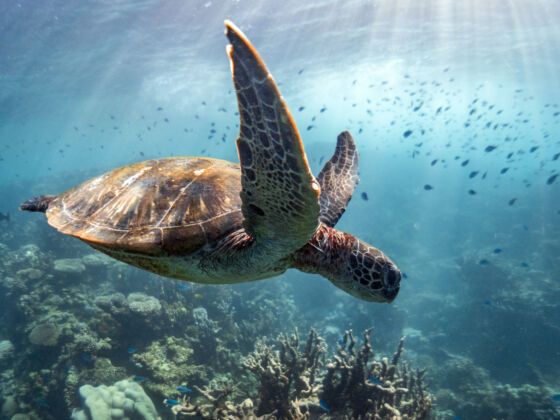Imagine walking along a beach littered with Coca-Cola bottles, plastic bags, and Lunchable containers that wash up with every wave. There is an oily green and black film squirming across the top of the salty water. There are no more seabirds soaring overhead and no one gets into the ocean. This is how I imagine visiting the immeasurable natural wonders of this blue planet if we continue to disregard the pressing need to preserve our oceans. However, with greater awareness and responsibility taken by humans to stop the pollution and overfishing of these precious ecosystems and marine habitats, I am hopeful that we will continue to take enormous strides in ocean conservation in 2017.


1. In 2016, around 800,000 volunteers swept coastlines all over the world to collect over 18 million pounds of trash washed up by the tides. On September 17, 2017, the International Coastal Cleanup should attract even more volunteers.
2. Boyan Slat, CEO and founder of The Ocean Cleanup and inventor of the Ocean Cleanup Array, will launch the pilot in the Pacific this year. Since 2012 (and age 16), Slat has been working on an invention that utilizes ocean currents and winds to catch, remove, and eventually send tons of plastic and garbage from our oceans to be recycled.
3. The world has taken note on climate change and the Paris Climate Agreement will hopefully prevent temperature rises over the next few years, as well as possibly reduce sea level rise.
4. America and Canada have been on an ocean protection spree. Most recently, Obama designated 115 acres of Arctic Ocean and 3.8 million acres of the Atlantic Ocean to be off limits to new offshore oil and gas drilling. Together, U.S. President Barack Obama and Canadian Prime Minister Justin Trudeau committed to safeguarding the Arctic Ocean and improving commercial fishing practices with NOAA’s Climate Science Strategy.
5. Australian and Queensland governments have begun investing more time and budget into the protection and conservation of the Great Barrier Reef. The Great Barrier Reef Marine Park Authority’s Reef 2050 Long-Term Sustainability Plan involves the removal of the invasive crown-of-thorns starfish, observing and maintaining biodiversity, managing activities, like dredged material dumping, that threaten reef habitats and improve the water quality by stopping the flow of pesticides from agricultural run-off.
6. All over the world, plastic bag use is being banned and regulated for the sake of keeping plastics out of our waterways. We’ve been getting better at remembering our reusable bags at the grocery store and inventing new ways to recycle bottles. Consider, for instance, every pair of leggings made by the eco-friendly new company, Girlfriend Collective, is made from at least 25 recycled water bottles. From woven bracelets and baskets to grocery bag sandals, there’s even an encyclopaedia of ideas for how to upcycle your plastic bags on Pinterest.
7. The French are taking an even larger step in the right direction in 2020 and banning plastic utensils. Not to say you cannot have your disposable cutlery, but it will be made only with biodegradable materials like paper or plant starch. France is also the leader in zero waste grocery stores. There are now four Day By Day stores in the country, which encourage customers to bring their own containers for bulk items, simply by not providing excess packaging.
I hope that we can continue to pay attention to our most valuable resource. In 2017, I hope we can be aware and alert of the pressures facing the world’s oceans. I hope we have an unceasing desire to clean and protect one of the Earth’s most mysterious and gorgeous spectacles. I hope that we can keep the surgeon fish, turtles, sea lions, sergeant majors, octopus, dolphins, eels, seagulls and other marine animals in mind when we slide plastic produce bag after plastic produce bag off the roll at the grocery store.
Most of all, I hope that we do not give up or blindly disregard what is going on in our politics. We, as human beings on this remarkable planet, are obligated to speak up when our governments place oil and money on a pedestal and ignore the detrimental effects to our environment and our own health. It is our responsibility to right our wrongs, clean up our own mess and keep our promises to our planet. So, let’s not get complacent. The current efforts are necessary and wonderful, but we have a long way to go before we reach the horizon of a clean ocean.